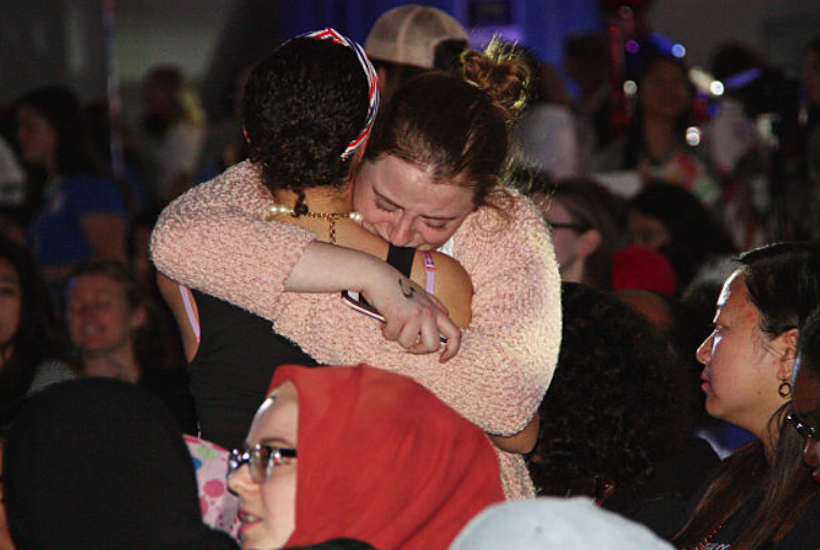A new survey consisting of 2,000 millennials (ages 22-38) has revealed some troubling statistics regarding how young adults see themselves in comparison to both their peers and older generations. An astounding eight in 10 flat out believe they are not “good enough” in virtually all areas of their lives. Furthermore, three quarters of the survey’s respondents admit that they constantly feel “overwhelmed” by pressure to succeed in their careers, find a meaningful romantic relationship, and meet others’ expectations.
Another seven in 10 millennials say that daily chores like going to the gym regularly, maintaining a presence on social media, and making enough money are among the top reasons why they feel overwhelmed from time to time. In all, 80 per cent of respondents even say these worries have negatively impacted their sleep and 79 oer cent admit that their overall mental health has suffered.
The survey, commissioned by plant-based food producer Alpro, found that the average millennial feels inadequate roughly 130 times per year.
Who could have possibly guessed that the cult of self-esteem, where everyone is special and everyone gets a prize, doesn’t well prepare young people to face the often tough realities of life? No wonder Gen Y now feels so overwhelmingly overwhelmed and out of their depth once the constant coddling by parents and the education system is no longer there to shield from the ordinary vicissitudes of life and they have to try to make it without the training wheels. The lessons they have learned — or, worse, been taught — have been wrong or insufficient to help analyse, prioritise and pursue. It’s difficult to learn pragmatism, realism, and the use of context, perspective and critical reasoning as an adult, if all these tools have been absent from your mental and emotional toolbox thus far.
It is hardly surprising that one of the results of this clash between the expectations and the reality is the wild new popularity of creeds like socialism, which provide a crutch of magical thinking to further delay the need for a radical (but not in a political sense) personal reassessment. Why is life seemingly so complicated and difficult when it was supposed to be pleasant and easy? Why am I not succeeding as much or as effortlessly as I have been led to believe I will?
Clearly, these kids believe, the problem is not us and those who have enabled us; it lies not with our mindset, not our worldview, not our life skills, not our coping mechanisms – the problem must be the system. It’s not us who are not working out, it’s the meta-structure – capitalism, power structures, democracy, social norms, conventions and traditions – around us that is irredeemably broken and needs to be replaced; the status quo is conspiring to keep us down when instead we should be up. Socialism is a tonic; with its promise of “money for nothing and chicks for free,” provides the easy (albeit impossible) way to square the circle of life. We all start our journey geocentric, only to eventually discover we live in a heliocentric universe. Socialism is just an attempt to change the laws of nature to make the sun revolve around ourselves again.
So what’s making Millennials miserable?
Over a quarter of respondents say their number one source of pressure is their parents, followed by a fifth of respondents who cite social media. An additional 17 per cent say their peers and friends cause them the most pressure. A lot of pressure also comes directly from within, though, with around half saying they routinely place an unfair amount of pressure on themselves to succeed.
What remains unmentioned is that pressure is natural and inevitable – and also necessary. It only becomes problematic when the priorities are wrong or unrealistic, resources inadequate and expectations mismatched.
This is not to say that the world in which Gen Y lives does not throw up new challenges that other generations might not have faced in the past. Housing is more unaffordable that it has been for a long time; social media, the Internet, and the 24-hour news and entertainment cycle are all novel phenomena with far-reaching impacts. On the other hand, the Millennial lives are healthier and wealthier and better educated (though not necessarily wiser) than ever before. Life’s necessities, from food to clothes, are cheaper and more abundant than for any previous generation. Travel and leisure amazes both in its variety and accessibility. In fact, there are more options and opportunities available to younger people today than at any other time in human history.
It’s a cliche that life is what you make it. It’s tragic that today’s young people feel overwhelmed by the challenges they face.
It’s even more tragic that instead of turning inward for solutions they choose to find the fault in their stars and so go on, raging against the night.
Arthur Chrenkoff blogs at The Daily Chrenk, where this piece also appears.
Got something to add? Join the discussion and comment below.
Got something to add? Join the discussion and comment below.
Get 10 issues for just $10
Subscribe to The Spectator Australia today for the next 10 magazine issues, plus full online access, for just $10.


























Comments
Don't miss out
Join the conversation with other Spectator Australia readers. Subscribe to leave a comment.
SUBSCRIBEAlready a subscriber? Log in